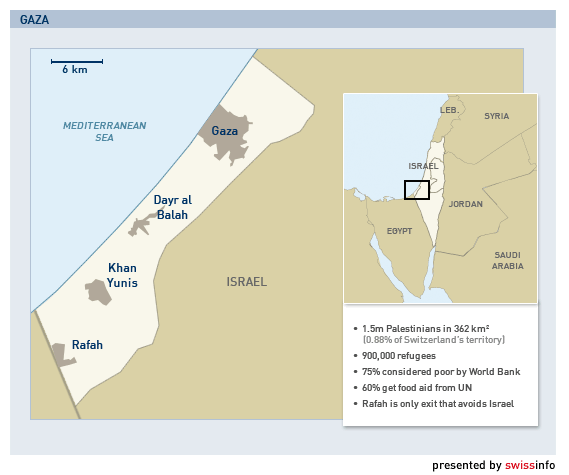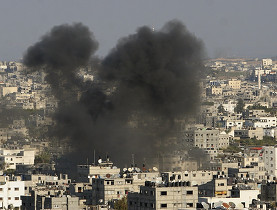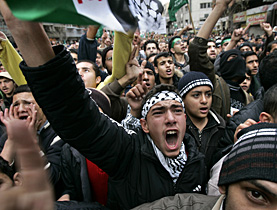Israel holds the diplomatic cards, experts say

Israel's military offensive in the Gaza Strip against Hamas has provoked only a cautious international reaction; Middle East experts tell swissinfo why.
Fighting between Israeli forces and Palestinian gunmen continued on Tuesday as Israel attempted to end militant rocket fire. The International Committee of the Red Cross (ICRC) meanwhile said the Gaza Strip faced “a full-blown humanitarian crisis”.
The military offensive against Palestinian rocket squads launched by Israel on December 27 has left over 600 Palestinians dead and as many as 3,000 injured in Gaza.
Three Israeli civilians and six Israeli soldiers have also died and Israeli police said a total of 520 rockets had been fired from Gaza into Israel in the past 11 days of fighting.
Israeli leaders describe the international community’s attitude towards the current crisis as extremely tolerant, said Middle-East specialist Pascal de Crousaz on Tuesday.
“This reaction contrasts with previous military operations, whether in 2006 in Lebanon or in 2002 at the Jenin Refugee Camp on the West Bank,” he said.
“Israeli diplomacy is pleased to have recently won back a lot of points on the international scene, as shown by the agreements that it just concluded with the European Union.”
Cautious Switzerland
According to former Swiss diplomat Yves Besson, Switzerland has reacted much more cautiously than in the past, in particular by firstly condemning Hamas and its rocket attacks against Israel in a foreign ministry statement on December 27.
“[Swiss Foreign Minister] Micheline Calmy-Rey was rapped on the knuckles by the rest of the Swiss government following her criticism of Israel during the 2006 war between Israel and the Lebanon-based Islamic organisation Hezbollah,” he said.
“Obviously Switzerland doesn’t want to be too outspoken with regards to Israel, after the tensions over the signing of a gas pipeline deal between Switzerland and Iran in 2007,” said de Crousaz.
That being said, Swiss caution is also indicative of other western governments’ positions.
“The situation is very different from that of Lebanon in 2006,” said de Crousaz. “In Gaza we are not talking about a sovereign state. Hamas took control by force, even if it won the elections earlier.”
“Western governments do not set great store by the permanence of the Hamas regime in Gaza – quite the contrary. The radical Islamic movement has bad press in western countries,” he added.
Besson echoed the Middle East specialist.
“Lots of governments, including those in the Arab world, and some officials within the Palestinian authority would be quite happy to get rid of Hamas. In this respect Switzerland clearly doesn’t want to appear as the sole defender of Hamas,” he said.
Waiting for Obama
Besson also thinks it highly unlikely that Hezbollah will help save Hamas.
“Hezbollah’s mentor [Iran] doesn’t want to spoil the opportunity of dialogue with the new [United States] Obama administration,” he said.
Unlike many international newspaper editors, de Crousaz is not surprised by the new US president’s silence over Israel’s Gaza military operation.
“Barack Obama doesn’t want to expose himself unnecessarily over such a controversial issue and unveil his battle plan too early,” he said, adding that the new president’s Middle East priorities are rather Iraq and the Iranian nuclear issue.
As a result, the Israelis are taking advantage of the handover of power in the US to act with certain impunity, as they have the support of the outgoing president, George W. Bush, said de Crousaz.
“It’s all completely cynical when you think about what’s happening to the civilian population in Gaza. But good diplomacy isn’t achieved through good sentiment,” said Besson.
Peace plans
Yet the former diplomat doesn’t exclude western caution leading to heavy pressure for a global peace agreement between Israel and Palestinian authorities once the new US administration is in place.
The question is whether Israel is able to meet its military objectives rapidly.
This is important as Arab governments from the region are in a particularly tricky situation, noted de Crousaz: “Their position is becoming increasingly delicate.
“The longer the operation goes on and affects the Gaza civilian population, the more people from these countries will take sides with the Palestinians and Hamas.”
swissinfo, Frédéric Burnand in Geneva
Swiss humanitarian activities in the Gaza Strip have been seriously reduced and almost suspended due to ongoing fighting between the Israeli army and Hamas militants.
A medicine programme has been badly affected, said the Swiss Agency for Development and Cooperation (SDC) on Tuesday. A building belonging to an SDC-supported partner organisation was also damaged following the bombing of a nearby police station.
For several years Switzerland has provided humanitarian aid to the civilian population of the Gaza Strip and the West Bank including East Jerusalem. The SDC, which has an office in Jerusalem, gave SFr20 million ($18 million) to the Palestinians in 2007.
Its projects focus on improving the prospects for peace, better living conditions, promotion of viable institutions in the long-term, support for the United Nations Relief and Works Agency for Palestine Refugees in the Near East (UNRWA), the International Committee of the Red Cross (ICRC) and various Palestinian and international non-governmental organisations.
It provided SFr12 million in 2008 and intends to immediately release further financial support, added to the SFr4 million already earmarked for UNRWA and the ICRC.


In compliance with the JTI standards
More: SWI swissinfo.ch certified by the Journalism Trust Initiative













You can find an overview of ongoing debates with our journalists here . Please join us!
If you want to start a conversation about a topic raised in this article or want to report factual errors, email us at english@swissinfo.ch.